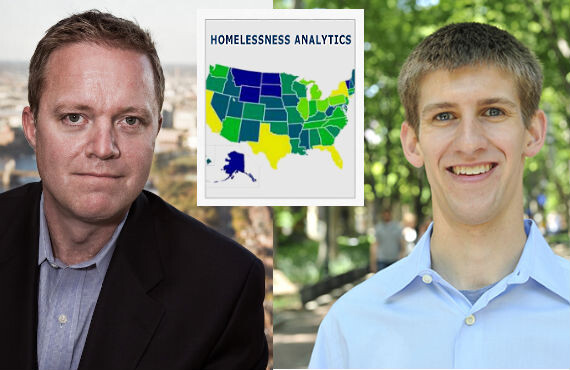Penn Researchers, New Technology Provide Access to Data on Homelessness
Researchers from the School of Social Policy & Practice at the University of Pennsylvania want to help end homelessness through sharing critical data.
Dennis Culhane and Tom Byrne, who also work with the National Center on Homelessness Among Veterans, have been instrumental in creating Homelessness Analytics, an interactive Web-based application that provides users with access to national, state and local data about homelessness among veterans and the general population.
Users can explore maps, create customized tables, generate charts and funnel data into spreadsheets or databases to conduct independent analysis.
Other functions include modeling and forecasting features that allow users to simulate expected changes in homelessness given changes in underlying indicators at the community level. As an example, a user can create a model of the relationship between median rent costs and the rates of homelessness in a specific region to better understand how changes in the housing market could impact homelessness.
Developed in collaboration with the National Center on Homelessness Among Veterans in the U.S. Department of Veterans Affairs and the U.S. Department of Housing and Urban Development, Homelessness Analytics has been in the works for more than a year.
“This technology provides a new way to examine the problem of homelessness and is a terrific example of what can be achieved through collaborative efforts between academic and government partners,” Culhane, a professor at the School of Social Policy & Practice and director of research at the National Center on Homelessness Among Veterans, says. “We are very excited about its potential to provide a range of stakeholders with actionable information that can be used to advance local, state and national efforts to prevent and end homelessness.”
Homelessness Analytics easily connects veterans or military personnel with their local Veterans Administration office, so that they can get access to the resources they might need.
For those veterans who are homeless or on the verge of being homeless, the Homeless Analytics app guides them to the VA’s website and information to its National Call Center. The VA’s National Call Center for Homeless Veterans (1-877-4AID VET/877-424-3838) is a free and confidential hotline that’s manned around the clock. Trained counselors are on standby to assist, providing callers with information about nearby programs and services.
“The truly great thing about the application is that it offers a flexible platform upon which we can expand and continue to provide valuable new tools and data to users,” Byrne, a research assistant professor at the School of Social Policy & Practice and an investigator at the National Center on Homelessness Among Veterans, explains.
The app is full of information compiled from dozens of sources, including the American Community Survey, the Centers for Disease Control’s Behavioral Risk Factor Surveillance System, HUD’s Fair Market Rents, the National Survey on Drug Use and Health, and the U.S. Department of Agriculture’s Food and Nutrition Service Program.
Homelessness Analytics was built by Azavea, a development firm in Philadelphia that specializes in the creation of location-based Web and mobile software.
“We already are in the process of developing the second phase of the application that will include, among other things, performance metrics for service providers,” Byrne says.








